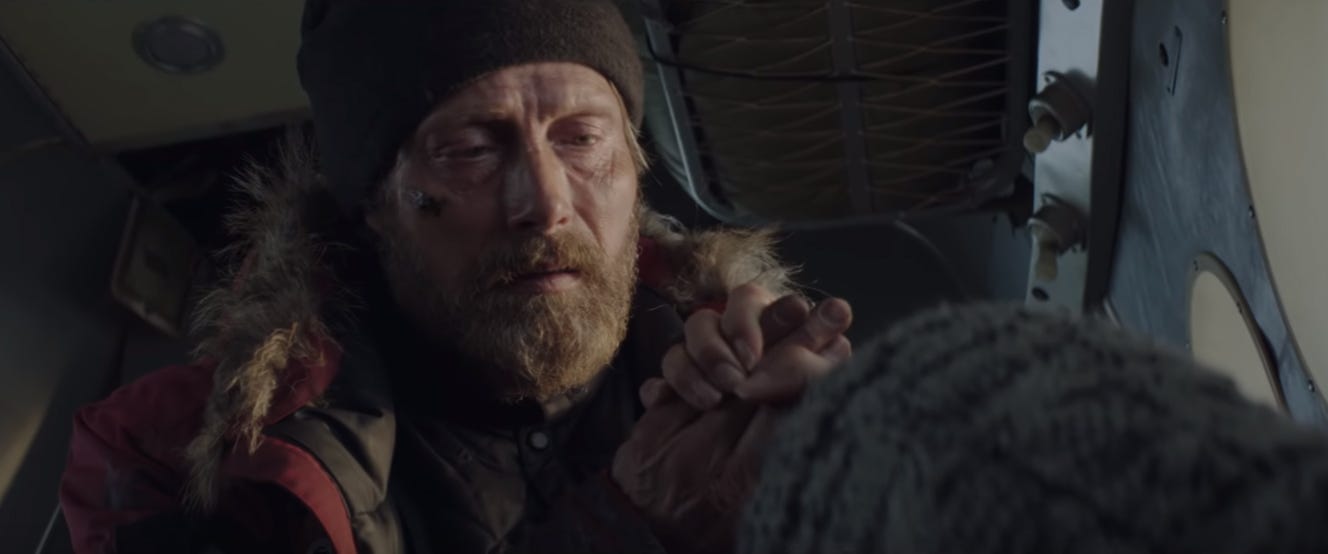Arctic

A harrowing tale of survivalism, Arctic showcases one of Mads Mikkelsen's best performances and shiver-inducing setpieces that pit its protagonist against one of the most unforgiving environments on Earth. The film is convincingly cold and starkly pretty—a sufficient encapsulation of its setting—and features some pretty stressful life-or-death situations for our hero.
So why didn't I care?
Unfortunately, Arctic spends all of its time and energy on being a grounded, bare-bones depiction of survival at the North Pole, and forgets to throw in any emotional foundations or personality for its main (and really only) character. As a result, we're left with a collection of relatively well-shot and superbly acted scenes that ultimately don't feel unified as an arc for the protagonist or, really, as much of a story at all.
As it were, the plot is centered on a man known to us only as Overgård (Mikkelsen); a pilot stranded in the Arctic after his plane crashed. The film picks up some time after the wreck—short enough that Overgård isn't in too bad of shape yet, but long enough that he's developed systems for catching fish from beneath the ice and trying to get a signal on his crank radio. His monotonous ticking time-bomb of a lifestyle (denoted by his recurring watch alarm) is interrupted when a passing helicopter attempts to rescue him. Arriving right at the onset of a harsh storm, the helicopter loses control and crashes, killing all but one person inside. The survivor (Maria Thelma Smáradóttir, who clearly landed the easier role here), doesn't speak Overgård's language, and is so badly injured that she can't walk or do much at all on her own.
Naturally, Overgård takes it upon himself to watch over her, but it soon becomes apparent that she is running out of time, and he needs to get help. He decides to make the trek, with her in tow on a sled, to a seasonal station within a few days' hike. From here, the pair encounter every polar obstacle one would expect.
Unfortunately, the film's conflict remains entirely physical and literal. Never is Overgård asked why he's doing something; never does he think about what's waiting for him back home—at least not that we get to see. If you're going to spend 90 minutes alone with a single character, one might like to know what's going on in his head. How better to immerse the viewer in the adversity of the character's situation? But writers Joe Penna (who also directs) and Ryan Morrison never make the leap into the subconscious or philosophical, preferring the let the script—all twelve lines of dialogue—subsist on the strength and raw determination of Mikkelsen's performance. The nice thing is that Mikkelsen never disappoints in that regard, but his grunting and straining against nature can only elicit so much engagement.
On the plus side, Penna and Morrison do get one thing right that many survival films (even the really good ones) don't; it feels real, it feels random, and it feels believably inconvenient. Penna and Morrison don't cheat the story to achieve a recognizable Hollywood flow. It's plenty conceivable that the events of this film could happen in this exact order and at this pace, and thus it never registers as phony for a second. The film itself echoes the authenticity of Mikkelsen, who noted that this was, understandably, the most difficult performance of his career.
Arctic is the kind of movie that's only good enough to make you wish it was better. I didn't have a bad time, and there's hardly a thing to complain about on a technical level. But without getting a feel for the source of Overgård's seething determination, or even a glimpse at his internal struggle, the film lacks both emotional resonance and a lasting impression. See it for Mikkelsen, if at all (though the man has no shortage of great performances in his filmography). Otherwise, Arctic probably doesn't have much to offer, unless you're a particularly avid wilderness-survival nut.

